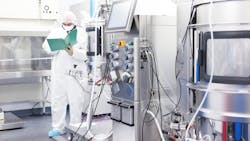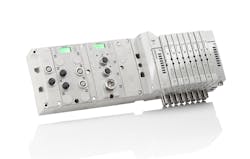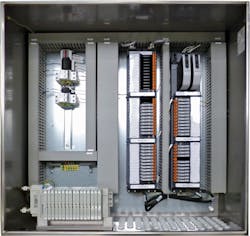Single-use technologies gain wide adoption in biomanufacturing
With the rise of biologics and personalized medicine, the biopharmaceutical industry is adding single-use technologies (SUTs) to their manufacturing options. Manufacturers are realizing the benefits of being agile, and many are adopting SUTs to turn over smaller batches of new products quickly and efficiently.
Single-use technologies utilize disposable bioprocessing equipment, such as bags and flexible tubing, instead of conventional, permanent stainless-steel systems. By eliminating the time-consuming clean-in-place (CIP) and steam-in-place (SIP) processes between batches, SUTs speed up the changeover time and greatly reduce the costs of energy, water and cleaning chemicals while accelerating time to market. SUTs also eliminate significant capital expenditure required when building traditional, stainless-steel systems.
These technologies are integral to today’s biomanufacturing landscape. Fluid control and automation systems and solutions can help processors leverage the benefits of single-use systems, such as reducing drug development time, enhancing operator safety and increasing productivity. Many pharmaceutical companies are also adding SUTs to their traditional stainless-steel systems to achieve manufacturing flexibility and the ability to manufacture multiple drugs at the same plant.
SUTs are key to minimizing downtime
Single-use systems overcome one of the biggest challenges faced by biomanufacturers — downtime. Typically made from platinum-cured silicone or biopharmaceutical-grade plastic, these products are disposed of after each use. As a result, single-use systems eliminate the need for cleaning between batches and offer a shorter changeover time than what is required with stainless steel systems.
For example, a line changeover for a stainless-steel bioreactor can take up to 10 hours for the same product and up to three weeks for a full product changeover. By comparison, a single-use bioreactor only requires a few hours between batches. Because of the quick changeovers, single-use systems lead to significantly higher throughput and enable smaller, more efficient batches. They can also help manufacturers decrease their facilities’ footprints, thereby reducing the costs of ventilation, heating and other utilities.
Biomanufacturers adding single-use systems to their production floor should work with fluidic system providers that offer fluid-automation products. These offerings can include valve automation solutions, air preparation equipment, instrumentation and integrated solutions. Fluidic system providers combine their products with process expertise to provide customers with comprehensive and reliable solutions.
Pneumatic pinch valves reduce install time and costs
From valve automation solutions to advanced control systems, a variety of solutions can help get a single-use biomanufacturing operation up and running.
Pneumatic pinch valves, for example, achieve process control automation in areas like bioreactor and fermentation tanks, chromatography, tangential flow filtration (TFF) skids or bottling and dispensing skids. Look for valves with innovative designs, in which the pinching mechanism holds the flexible tubing securely in place while preventing damage to tubing from repetitive pinching action.
Valve providers should always keep user safety at the forefront of product design. Pinch valves, for example, should include a protection guard that allows operators to safely work around the pinching mechanism, as well as a manual override function that lets operators insert or remove tubing without actuating the valve. In addition to keeping operators safer, enhanced valve design accelerates setup, reduces costs and makes unscheduled maintenance easy — all of which are critical to maximizing uptime in single-use systems.
The right pinch valve is tested to have a long service life while providing a reliable pinching force without the need for an electrical connection. It should also resist corrosion due to tube breakage or washdown procedures.
Finally, innovative tubing adaptors give process engineers flexibility to use the same pinch valve with different tubing diameters. OEMs can further benefit from partnering with a valve manufacturer who can develop tailored solutions for unique process designs.
Benefits of a one-stop-shop for process control automation
As single-use technologies gain wider adoption globally, it pays to use a single, diversified manufacturer that can deliver comprehensive fluid-control solutions. To that end, some providers offer a wide range of systems and solutions that ensure product quality, improve process reliability and reduce operating costs in a biomanufacturing plant.
In addition to pinch valves, which overcome many of the issues related to downtime and operator safety in single-use systems, some diversified technology companies offer directional valves, communication protocols, air preparation units and other technologies — all of which work together seamlessly so manufacturers can focus on what really matters: optimizing biomanufacturing operation. From design and implementation to start-up and ongoing technical support, a provider can help a plant operate at the peak of its performance, enabling operators to:
- Control aggressive fluids with durable valves. Angle body valves handle aggressive fluids, such as steam, hot water, solvents and light slurries in CIP and SIP applications. Air- or water-pressure-operated with a straight-through design, these valves come with advanced accessories, including a signaling box, a compact positioner for proportional control and a stroke limiter for even greater precision.
- Speed time to market with high-performing valve manifolds. Valve manifolds with modular, flexible designs simplify installation, commissioning and system integration in single-use applications — reducing engineering costs and speeding time to market. These plug-and-play systems include high flow rates, input/output (I/O) capabilities, compatibility with popular industry protocols and a pressure shut-off function, which allows individual valves to be replaced without halting the production process — further reducing line downtime and maintenance in single-use applications.
- Improve valve efficiency with next-generation electronics. Electronic fieldbus platforms provide pneumatic valve manifolds with fieldbus and Ethernet connectivity, as well as a graphic display for configuration, commissioning and diagnostics. They allow programmable logic controllers (PLC) in single-use systems to more efficiently turn valves on and off. They also channel I/O data from sensors, lights, relays, valves and other I/O devices via various industrial networks.
- Minimize downtime with quality air-preparation equipment. Air-preparation devices treat the air quality and pressure in a plant’s pneumatic system. Modular filter regulator lubricator (FRL) assemblies with body-to-body clamps facilitate assembly during installation and service, while optional end plates allow the manifold assembly to be quickly removed by loosening screws — keeping downtime to a minimum in single-use systems.
- Optimize plant performance with advanced control systems. Distributed control systems (DCS) can improve manufacturing agility in single-use systems by helping to meet demands in real time. These easy-to-use automation systems often include a suite of services geared toward simplifying operational complexity and reducing project risk. They also adapt to meet specific biomanufacturing needs — scaling easily without adding complexity.
- Utilize IIoT solutions for more informed data-driven decision making: Digitalization of components and systems is empowering production staff and managers with the real-time actionable information. All stakeholders in the complete value-added chain are able to exchange information thanks to the advanced technologies used for networking and sensor-based intelligent components. These solutions support and enhance areas such as production efficiency, energy management and integration of the single-use solutions.
A robust, customized control cabinet
In clean rooms or environments subject to washdown, manufacturers need a quick, easy and space-saving solution to protect sensitive electrical and pneumatic components. Already assembled, tested and ready to install, integrated enclosure solutions ensure corrosion- and damage-resistance in sensitive installations.
These turnkey packages also withstand regular exposure to aggressive cleaning fluids. In addition to biomanufacturing applications, these enclosures are ideal for the life sciences, food and beverage, chemical and packaging industries. The valve systems are equipped with an innovative display that clearly depicts default settings for faster installation and commissioning. An Individual shut-off makes the valve system suitable for continuous processes that allow the valve to be replaced while the valve manifold is under pressure.
Mike Gromczak is the Product Marketing Manager — Life Sciences, Americas, at Emerson’s Fluid and Motion Control business. He focuses on new product development, market research and marketing of ASCO products for the life sciences market. He has an extensive product management and marketing background in several product categories and industries. Mike has a Master of Science degree in Structural Engineering from Cracow University of Technology and an MBA from University of Michigan.
About the Author
Mike Gromczak
Product Marketing Manager — Life Sciences — Americas at Emerson
Mike Gromczak is the Product Marketing Manager — Life Sciences, Americas, at Emerson’s Fluid and Motion Control business. He focuses on new product development, market research and marketing of ASCO products for the life sciences market. He has an extensive product management and marketing background in several product categories and industries. Mike has a Master of Science degree in Structural Engineering from Cracow University of Technology and an MBA from University of Michigan.



